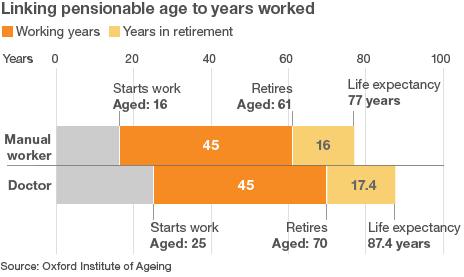Government defiant over women's pension age change
- Published
- comments
The government will press ahead with plans to raise the state pension age for women but ministers have promised to look at "transitional" arrangements.
The coalition wants to raise the pension age for women from 60 to 65 by 2018 as a prelude to both female and male pension ages rising to 66 in 2020.
Critics say 330,000 women face working up to two years longer before retiring as a result of the proposals.
The coalition won a Commons vote on the plans by a majority of 70.
MPs voted to give a second reading to the Pensions Bill by 302 votes to 232.
During a Commons debate on the proposals, Work and Pensions Secretary Iain Duncan Smith insisted the coalition would not waver from its commitment to equalise the state pension age in 2018.
He told MPs: "Responsible government is not always easy government. It involves commitment, tough decisions and a willingness to stay the course.
But he said he was "willing to work to get this transition right" amid concerns over the "relatively small number of women" set to be disadvantaged.
'Tough decisions'
Delaying the move to 66 until 2022 would cost the taxpayer £10bn, which would be an "unfair financial burden borne disproportionately by the next generation", he added.
Last year, Chancellor George Osborne announced plans to accelerate the rate at which women's pension age would rise to equal that of men, currently 65.
The previous Labour government had agreed to achieve equalisation by April 2020, but the coalition's plans will see it achieved by November 2018.
Ministers will then use this extra time to raise the pension age to 66 for everyone.
The critics say many women affected by the proposals will have to wait between 18 months and two years longer than expected before they get their state pensions. They also say the changes are unfair as some women are being given as little as five years' notice of the changes.
More than 170 MPs have signed a Commons motion calling for a rethink over the plans, including both Conservative and Liberal Democrat backbenchers.
Lorely Burt, chair of the Lib Dem parliamentary party, said those affected would not have time to plan their retirement and many would be "financially a great deal worse off".
'Careers interrupted'
For Labour, shadow work and pensions secretary Liam Byrne said the government's plans had thrown the retirement plans of thousands of women into chaos.
"Women in their late 50s will have earned less over their lifetime, they have lower state pensions and private savings than men, many of them are unable to join a workplace pension and have interrupted careers to look after their family, many will have stood down from jobs on the understanding they would get that state pension early.
"What on earth are these women supposed to do with the measures set out in this Bill?"
James Gray was among Tory MPs to urge the coalition to think again.
"Going around the corridors and tea rooms in Westminster talking to Tories, Lib Dems and of course Labour MPs, they are saying this is an injustice being done to a small number of people," he said.
Meanwhile, Ros Altmann, director general of over-50s organisation Saga and a former government adviser on pensions, said ministers could face a costly legal challenge if they did not make changes.
"The current plans are unfair and may, indeed, be illegal in public law terms, since they clearly do not give women adequate notice of the large changes in pension age that they face."

Ahead of the debate, Prime Minister David Cameron appeared to get his own policy on pensions wrong in an interview with BBC Radio 2 - suggesting the retirement age will move to 66 in 2018.
The prime minister's official spokesman said Mr Cameron was merely saying the process towards 66 for men and women begins in 2018 but will be complete by 2020.
The Commons debate comes as union leaders are threatening industrial action over the government's proposals for public sector employees to work longer and pay more for less generous entitlements in retirement.
- Published20 June 2011
- Published18 June 2011
- Published8 June 2011
- Published20 October 2010